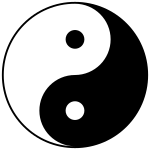Taiji (philosophy)
| Taiji | |||||||||||||||||||||||

A commonly used version of a symbol for Taiji, called Taijitu
|
|||||||||||||||||||||||
| Chinese name | |||||||||||||||||||||||
|---|---|---|---|---|---|---|---|---|---|---|---|---|---|---|---|---|---|---|---|---|---|---|---|
| Traditional Chinese | |||||||||||||||||||||||
| Simplified Chinese | |||||||||||||||||||||||
| Literal meaning | "Supreme Pole/goal" | ||||||||||||||||||||||
|
|||||||||||||||||||||||
| Vietnamese name | |||||||||||||||||||||||
| Vietnamese | thái cực | ||||||||||||||||||||||
| Korean name | |||||||||||||||||||||||
| Hangul | 태극 | ||||||||||||||||||||||
| Hanja | 太極 | ||||||||||||||||||||||
|
|||||||||||||||||||||||
| Japanese name | |||||||||||||||||||||||
| Kanji | 太極 | ||||||||||||||||||||||
| Kana | たいきょく | ||||||||||||||||||||||
|
|||||||||||||||||||||||
| Transcriptions | |
|---|---|
| Standard Mandarin | |
| Hanyu Pinyin | tàijí |
| Wade–Giles | T'ai Chi |
| Yue: Cantonese | |
| IPA | [tʰāːi kɪ̀k] |
| Jyutping | tai3 gik6 |
| Southern Min | |
| Hokkien POJ | thài-ke̍k |
| Eastern Min | |
| Fuzhou BUC | Tái-gĭk |
| Transcriptions | |
|---|---|
| Revised Romanization | Taegeuk |
| McCune–Reischauer | T'aegŭk |
| Transcriptions | |
|---|---|
| Romanization | Taikyoku |
Taiji (simplified Chinese: 太极; traditional Chinese: 太極; pinyin: tàijí; literally: "great pole") is a Chinese cosmological term for the "Supreme Ultimate" state of undifferentiated absolute and infinite potential, the oneness before duality, from which Yin and Yang originate, contrasted with the Wuji (無極, "Without Ultimate").
The term Taiji and its other spelling T'ai chi (using Wade–Giles as opposed to Pinyin) are most commonly used in the West to refer to Taijiquan (or T'ai chi ch'uan, 太極拳), an internal martial art, Chinese meditation system and health practice. This article, however, refers only to the use of the term in Chinese philosophy and Taoist spirituality.
The word 太極 comes from I Ching: "易有太極,是生兩儀,兩儀生四象,四象生八卦,八卦定吉凶,吉凶生大業。"
Taiji () is a compound of tai "great; grand; supreme; extreme; very; too" (a superlative variant of da "big; large; great; very") and ji "pole; roof ridge; highest/utmost point; extreme; earth's pole; reach the end; attain; exhaust". In analogy with the figurative meanings of English pole, Chinese ji 極 "ridgepole" can mean "geographical pole; direction" (e.g., siji 四極 "four corners of the earth; world's end"), "magnetic pole" (Beiji 北極 "North Pole" or yinji 陰極 "negative pole; cathode"), or "celestial pole" (baji 八極 "farthest points of the universe; remotest place"). Combining the two words, means "the source, the beginning of the world".
...
Wikipedia
